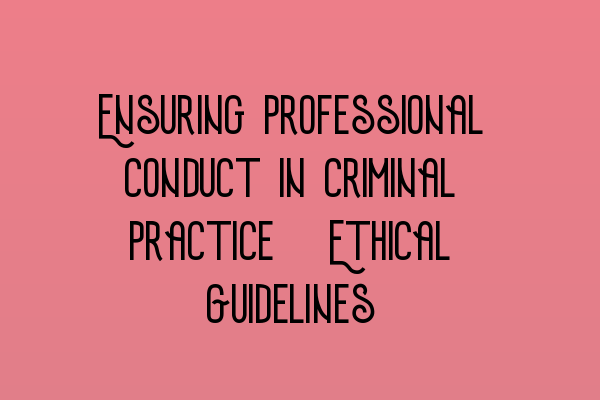Ensuring Professional Conduct in Criminal Practice: Ethical Guidelines
In the field of criminal law, maintaining professional conduct is of utmost importance. As legal professionals, we have a responsibility to uphold ethical standards that ensure fairness, justice, and the protection of our clients’ rights. In this article, we will discuss the key ethical guidelines that every criminal law practitioner should adhere to.
1. Confidentiality and Legal Privilege
Confidentiality is the cornerstone of the attorney-client relationship. Lawyers must maintain the confidentiality of all information disclosed by their clients, unless permitted by law or authorized by the client. The principle of legal privilege protects this confidentiality and allows clients to fully disclose all relevant details without fear of their information being used against them.
As a criminal law practitioner, it is essential to maintain strict confidentiality, ensuring that all client information is securely stored and protected. Breaching client confidentiality can not only harm your reputation but also jeopardize the trust your clients place in you.
2. Conflict of Interest
One of the most critical ethical considerations in criminal practice is avoiding conflicts of interest. A conflict of interest arises when the lawyer’s personal or financial interests conflict with the duty to act in the client’s best interests.
It is imperative to conduct comprehensive conflict checks before accepting a new client. This includes checking for any past or current relationships that may compromise your ability to provide unbiased and diligent representation. If a conflict of interest arises, it is crucial to promptly disclose it to the client and, if necessary, withdraw from representing them.
3. Honesty and Integrity
Honesty and integrity are vital traits for every legal professional. Clients rely on their lawyers to provide accurate and honest advice. Misleading clients, concealing important information, or engaging in dishonest practices is not only unethical but can also have serious legal consequences.
By maintaining a high level of honesty and integrity, you establish trust with your clients, the court, and other legal professionals. This trust is essential for the effective functioning of the criminal justice system.
4. Competence and Professional Development
A commitment to competence is crucial for criminal law practitioners. It is essential to continuously update your knowledge and skills to provide the best possible representation to your clients. Staying informed about changes in criminal law, procedural rules, and legal precedents is vital.
Investing in professional development courses, like the SQE 1 Preparation Courses and SQE 2 Preparation Courses, can help you stay at the forefront of legal practice. These courses provide comprehensive training and prepare you for the Solicitors Qualifying Examination (SQE), which is essential for aspiring solicitors in the UK.
5. Compliance with Regulatory Bodies
Legal professionals must comply with the rules and regulations set by the Solicitors Regulation Authority (SRA) and other relevant regulatory bodies. Familiarize yourself with the SRA Code of Conduct and ensure that you adhere to its provisions.
Additionally, stay updated with SRA SQE Exam Dates to ensure compliance with exam requirements.
Conclusion
By adhering to ethical guidelines, criminal law practitioners can maintain professional conduct, foster trust with clients, and contribute to a fair and just legal system. Upholding principles such as confidentiality, avoiding conflicts of interest, practicing honesty and integrity, continuously developing competence, and complying with regulatory bodies are essential for a successful and ethical criminal law practice.
To enhance your legal knowledge and skills, consider taking practice exams and mocks, such as the SQE 1 Practice Exam Questions and SQE 1 Practice Mocks FLK1 FLK2, which provide valuable insights into exam preparation.
